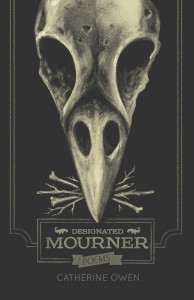Review by Esther Griffin
Designated Mourner
by Catherine Owen
ECW Press
 Catherine Owen’s latest book of poetry, Designated Mourner, is an elegy to her partner, who died suddenly at the age of 29 after his drug use led to a fatal blood clot. The honesty of Owen’s poetry makes this collection a welcome companion for anyone who has suffered loss. Whether it is the death of a loved one, a painful estrangement, or the figurative death of a relationship, this collection will make you feel less alone on your journey through grief. As I read, I grieved alongside the poet. For her unimaginable loss, and for all the loved ones I’ve lost. These poems gave me permission to linger in memory and sorrow—to push back against those who feel that grieving has a time limit.
Catherine Owen’s latest book of poetry, Designated Mourner, is an elegy to her partner, who died suddenly at the age of 29 after his drug use led to a fatal blood clot. The honesty of Owen’s poetry makes this collection a welcome companion for anyone who has suffered loss. Whether it is the death of a loved one, a painful estrangement, or the figurative death of a relationship, this collection will make you feel less alone on your journey through grief. As I read, I grieved alongside the poet. For her unimaginable loss, and for all the loved ones I’ve lost. These poems gave me permission to linger in memory and sorrow—to push back against those who feel that grieving has a time limit.
Owen organizes her collection into three parts: Consanguinitas (blood ties), Nenia (funeral song), and Cineris (ashes of a corpse). In Nenia, the poems are presented within seasons, beginning in spring, following the death of her partner. Many poems reveal in-the-moment stabs of pain and loss, while others explore memories that haunt: his narrow waist, his autopsy scars, and even his socks. Amid her free verse poems there are sprinkles of villanelles and sonnets, all woven with raw and beautiful sensory language.
What drew me in the most about this collection was its honesty. Owen describes the subtle moments, like “small/ of the back kisses” (6) but doesn’t shy away from the harsher realities of addiction and what it took from her. She celebrates her partner for everything that was beautiful and everything that was flawed. In “The Crackhead’s Palindrome”, the reason for his death becomes clear: “it comes right down to this. Just one more hit.” (13) Owen’s partner had been trying for a fresh start, intent on beating his addiction, but slipped from intent and died of a blood clot in his heart. When I read “the dark more than dark when nothing calls” (12) it was like I had experienced the loss as well.
Owen journeys from the initial shock of her partner’s death to the morbid realities of having to identify his body. She writes about his cremation and her decision to sprinkle his ashes in the forest. Her language is vivid and cutting as we stand among the trees in “What I Did With the Remains”, watching her flesh transform with the ashes of her lover:
Instead, amid mosquitoes and briars, I felt you
one last time on my flesh, smeared the slight sear of ashes
on face, breasts, pubis, became blanched.
You so loved to encompass me, exclaim over how we fit in our
odd, bony perfections, locked into each other.
Now the grit adhered to the salt and I screamed at how
close to me you are, how distant. (40)
How can someone be so alive, so tangible in our lives, and then gone? Many of these poems are seeking a peace that may never be achievable. Owen shows us this with observations about loss and the pain of having to survive the motions of everyday life:
I couldn’t sleep
& so I sat small upon the bed
eating an orange
as the living do. (68)
Designated Mourner is a book about unimaginable grief and the journey of learning to live with loss. Owen’s gorgeous sensory language invites us to travel along with her and find a way through our own pain. This collection encompasses everything it means to survive being human:
Three years ash –
And the pain doesn’t stop, no I’m lying now, it stops,
I forget, I listen to tipsy Irish poets bluster in lovely fashion
About the darkest birds in the world and then, after the singing,
It returns again –
Sharper, for a time, than before. (99)
Catherine Owen is the author of nine collections of poetry and a book of essays and memoirs. Her latest book is The Other 23 & a Half Hours or Everything You Wanted to Know that Your MFA Didn’t Teach You. Her books and poems have been nominated for numerous awards, including the Gerald Lampert Award, the BC Book Prize, the ReLit Award, the George Ryga Award for Social Awareness in Literature, Short Grain, and The Earle Birney Prize. Her book of poetry, Frenzy (Anvil), won the Alberta Literary Award in 2009. Visit Catherine Owen’s website at http://cathowenpoet.150m.com/
Esther Griffin teaches English Literature and Creative Writing at Georgian College in Barrie, Ontario. Her poetry and fiction have been published in various anthologies, and she is currently pursuing her MFA in Creative Writing at the University of British Columbia. Visit her website at www.esthergriffin.ca